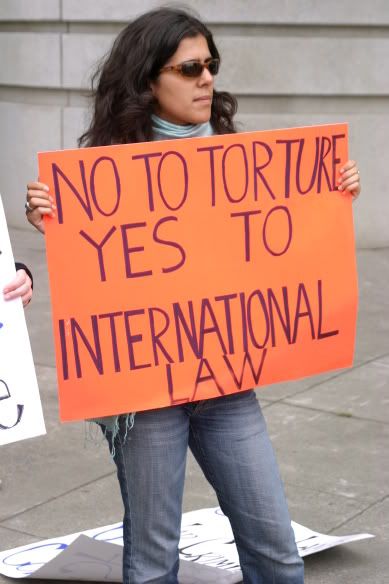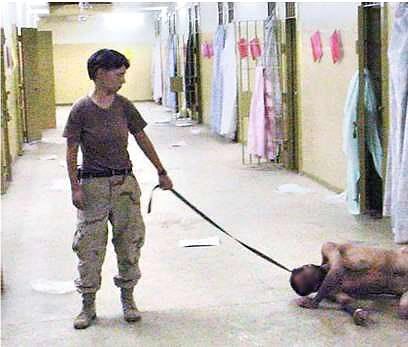Tortured Questions
 I expect my government to be truthful, but I've got constructive knowledge that government can lie or spin.
I expect my government to be truthful, but I've got constructive knowledge that government can lie or spin.Constructive knowledge is defined by lawyer Steve at Binjo Ditch as, "the type of knowledge that one using reasonable care or diligence should have, and therefore is attributed by law to a given person." I've lived through the Clinton years and the Nixon years, so I have constructive knowledge that even the U.S. government can lie.
That hardly makes me a wild conspiracy theorist. I certainly have given the Bush admin the benefit of the doubt, for a number of reasons. First, my own constructive knowledge tells me that the left has exaggerated, trumped up and outright fabricated criticisms against Bush and the war. Most of these accusations of lying are easily disproved, as is the case with "Bush lied, people died" on WMDs. So constructive knowledge reassures me that many of those making the claims are hardly credible; they're ranters, negative beings, BDR sufferers. Here's a good case in point. And finally, Bush just always struck me as an admirable, Christian man who wouldn't put up with lying. Call me naive; it's just been my impression.
Constructive knowledge also tells me that members of al-Qaeda and other jihadists will lie, and indeed are encouraged to lie, about being tortured while being held captive by American forces. They're trained to do it and the Koran encourages them to do it, and it's important to keep that in mind as we proceed.
So, who's lying in this case:
WASHINGTON (AP) - Medical examinations of former terrorism suspects held by the U.S. military at Abu Ghraib prison in Iraq and Guantanamo Bay, Cuba, found evidence of torture and other abuse that resulted in serious injuries and mental disorders, according to a human rights group.
 The story from last week -- which of course I can't risk clipping more from, given AP's recent strict enforcement of its copyrights -- goes on to describe what was found in medical examinations of 11 former Guantanamo and Abu Ghraib detainees. Most shocking are allegations (supported, according to the report, by evidence of burns on thumbs) of electric shock, and of sodomization. (The latter charge was not substantiated, as the accuser would not allow an inspection of his private parts.)
The story from last week -- which of course I can't risk clipping more from, given AP's recent strict enforcement of its copyrights -- goes on to describe what was found in medical examinations of 11 former Guantanamo and Abu Ghraib detainees. Most shocking are allegations (supported, according to the report, by evidence of burns on thumbs) of electric shock, and of sodomization. (The latter charge was not substantiated, as the accuser would not allow an inspection of his private parts.)Is my country lying to me, to us, about its policies on torture? Or is the human rights group? Or are the former detainees?
Arguing for the latter two is the timing of the release of the report, just as the (Dem-dominated) Senate Armed Services Committee began looking into warnings from military lawyers to the Pentagon regarding the possible illegality of some interrogation measures. Timing like this is often a sign that a study's been trumped up.
Arguing that interrogation techniques went beyond what we were told and what I personally would accept are the wear and tear caused by the endless stream of reports, and these latest reports, and my cognitive knowledge that the reported incidents at Abu Ghraib were, in fact, abominable.
Arguing against that is the nebulous qualities of the human rights group's report. Some of these detainees have been out of our control for a number of years, and all of them were living lives before they were detained. There's no way of knowing if their injuries occurred while under US control -- if they occurred at all. And that guy wouldn't pull down his pants to allow an examination.
Also on point is the fact that some of the alleged "tortures" are mere miscomforts suitable for the interrogation of enemy: sleep deprivation, stress positions, cold, heat, hunger. Sorry, but this is not about redefining torture; it's about whether torture -- being shocked or sodomized, for example -- occurred.
Arguing for concern that it might just be true is the committee's report on the lawyer's findings. Binjo Ditch summarizes the whole deal:
When military lawyers warn the Pentagon that interrogation techniques they are looking into may be illegal, then the DOD should know that they need to tread carefully, and to look into the legality of the issue, rather than dive in with reckless disregard for the law.To which Lindsey Graham replied (paraphrasing here for AP's sake), "Bunk! It was just an irresponsible and shortsighted job by the lawyers!" I would normally say we have a he said/she said here, and that I'm biased to trust the government over the accusers, but Graham made an odd choice of words that's troubling. Had he used "wrong and deliberate," he would have communicated one thing (like the most recent National Intelligence Estimate on Iran), but he chose "irresponsible and shortsighted," which communicates something entirely different.
In the end, we must look for known facts, and that causes us to dismiss the human rights group's report because it is just too unsubstantiated. That leaves the Pentagon lawyers, the interrogators and those being interrogated.
Without knowing the Pentagon lawyers, my constructive knowledge tells me staff at State and the CIA have gone out of their way to throw up challenges and embarrassments to the administration, so I can't reasonably say the Pentagon staff would be any different. Their warnings appear to me to be part good and part reliant on a BDS definition of torture.
 As for the interrogators, we rightfully don't know much. If their techniques were common knowledge, the enemy could train themselves to deal with them. But we do know this: Every interrogator knows the rules; they're clearly written. And every interrogator does not want to be the next Lynndie England, exposed, shamed and convicted.
As for the interrogators, we rightfully don't know much. If their techniques were common knowledge, the enemy could train themselves to deal with them. But we do know this: Every interrogator knows the rules; they're clearly written. And every interrogator does not want to be the next Lynndie England, exposed, shamed and convicted.That leaves the detainees, who constructive knowledge tells us have been trained to allege torture. In the end, this is the only rock-solid piece of evidence in the entire story. All we can say for certain out of all of this is that despite what the Pentagon lawyers said, despite what the interrogators have said, the only provable fact out of the whole pile is that detainees lie.
So, uncomfortable as this entire matter made me about what my country's up to, it must remain just that: a discomfort, a confusing addition to my constructive knowledge. In the end, it changes nothing.
Labels: Abu Ghraib, Torture, War in Iraq




<< Home